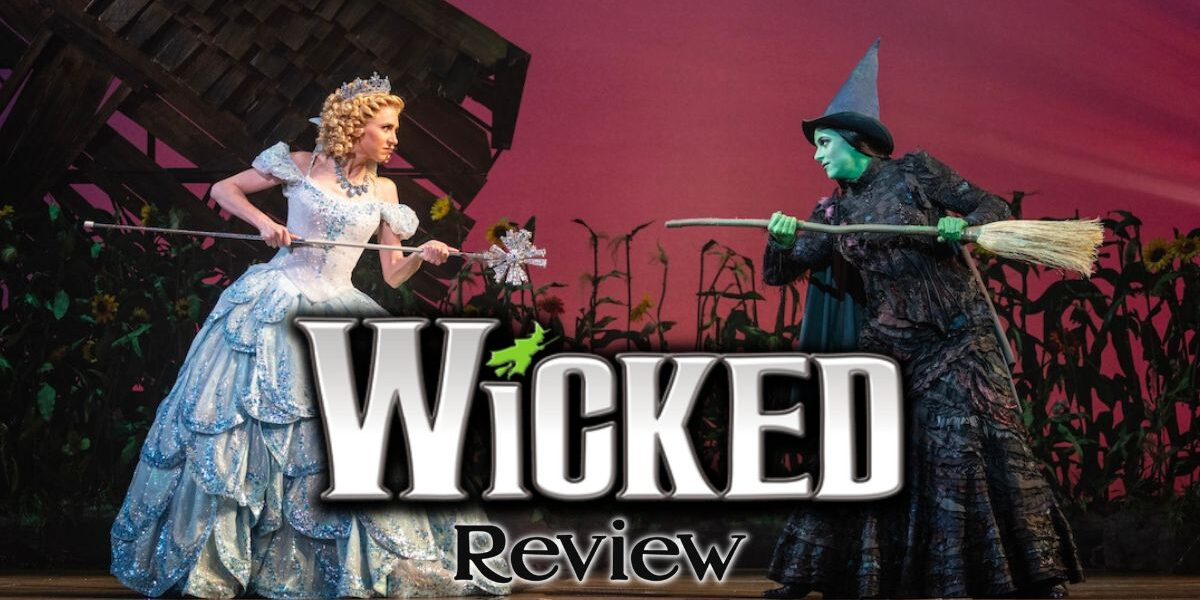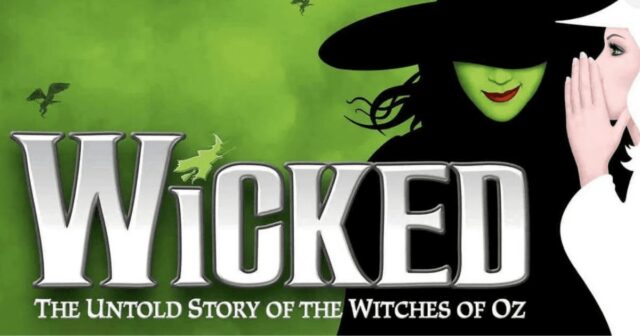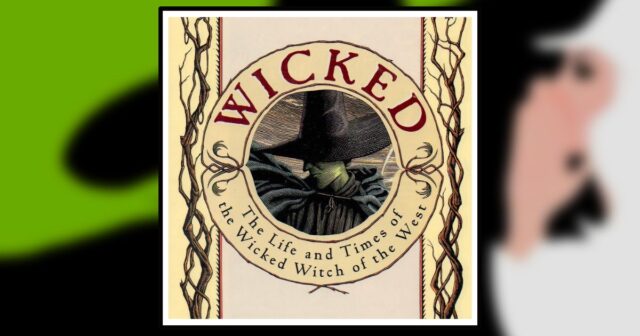While I have been a massive fan of musicals, I hadn’t seen many shows growing up. Community theater sure, but my entry into the world of Broadway came in the form of VHS and DVDs with my mother and grandmother, as they took me through all their favorites. It wasn’t until I was graduating from my undergrad that I received tickets to a Broadway in Detroit show, which opened up an entirely new world to me. It just so happens that this first show that reignited my passion for musicals and began my foray into the world of Broadway was none other than Wicked.
There’s something apropos about what began as a hobby during the pandemic has led me back to where my love of Broadway began. Gathered in the Detroit Opera House, everyone was ready to return to Oz once again as the story of the Wicked Witch unfolds in the North American Tour of Wicked. This is not your mother’s The Wizard of Oz, as Wicked begins long before Dorthy arrives via a falling house and a twister. Having been on Broadway for over 20 years, becoming the fourth-longest running show, it’s not a surprise that this show has become a staple in the touring seasons across America. So how does the tour hold up to the Broadway version?
[Warning: Spoilers from Wicked are below!]
The land of Oz before the ruby slippers
Not wanting to alienate fans of the original The Wizard of Oz too much, Wicked begins in the aftermath of the Wicked Witch’s downfall. Glinda (Celia Hottenstein) arrives in Munchkinland to the cheers and celebration of its inhabitants. While everyone is happy, Glinda is torn as her history with The Wicked Witch is complicated, spanning years, going back as far as schooling at Shiz University. It’s then that the story frameshifts back to Elphaba’s (Olivia Valli) childhood and then through to their first day at school.
To be expected, the relationship between Glinda, named Galinda back then, and Elphaba wasn’t great. In fact, they begin as enemies because of how opposed in life they are to each other. Elphaba is the result of years of abuse at the hands of her angry father. A project of an affair between her mother and a traveling salesman of a bright green potion, Elphaba comes out with a green complexion. This sets off a chain of events that results in her mother dying in childbirth and her sister, Nessarose (Tara Kostmayer) requiring a wheelchair.
All of this is blamed on Elphaba, who shoulders this immense burden by becoming quiet and sarcastic. She dotes on her sister, which is why she attends Shiz University so that she can care for Nessarose in any way she requires. However, things don’t go according to plan and Elphaba ends up boarding with Galinda, who is everything Elphaba is not.
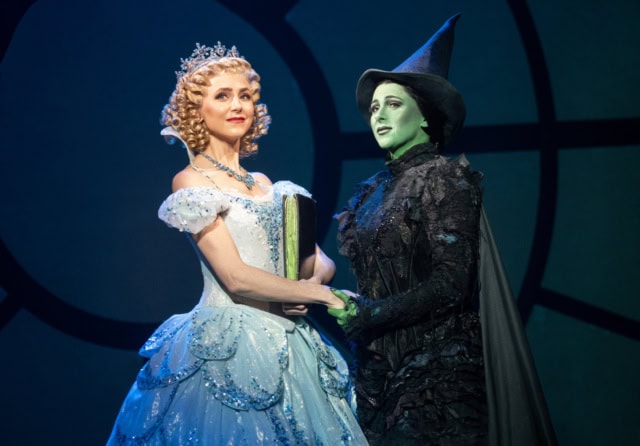
Where Elphaba is quiet, Galinda is vocal. She’s used to getting everything she wants because of her, and her father’s, status. She’s been handed everything in life and doesn’t understand when something doesn’t go her way. So different from Elphaba, who hasn’t had anything go her way in her entire life. But Galinda finds something in Elphaba that she hasn’t found in anyone else, someone who won’t bend to her every whim.
The two hate each other, not able to see eye to eye in any respect. However, over time they develop a friendship that seems as unlikely as any before. This friendship becomes tested as Elphaba becomes discontented with what’s going on in the land of Oz. Can The Wizard (Timothy Shew) help the animals across the land from being eradicated, or is it up to Elphaba to defy gravity and do it all herself?
The positives and negatives of Wicked at the Detroit Opera House
Wicked is one of those shows that no matter what, you’ll have a good time. Love The Wizard of Oz? Perfect, then this is the show for you. Enjoy musicals? Wonderful, then Wicked will be right up your alley. For those who enjoy going to the theater or just a night out, Wicked is one of those shows that are easily digestible, which isn’t always true for Broadway musicals. Wicked is accessible to everyone. It’s a great show for families as well as older theater-goers who are looking for a wonderful night out.
Part of what makes it for everyone is that it’s a version of a story that many are familiar with. The Wizard of Oz was on television every holiday, a tradition that my mother said had been happening since she was a young child. These characters are easily recognizable, so Wicked itself relaxes the viewer just a bit, even if the story isn’t quite the same.
The story is intriguing, watching this well-known villain start as someone who just wants to do good in the world. Her motives are easily twisted by the powers that be, as she works against an entire corrupt system. Wicked stops and makes you think perspective in other stories we think we know so well, which is perhaps one of the most interesting parts of the entire show. You begin to feel for Elphaba, and sympathize with her, which paints The Wizard of Oz in an entirely different light.
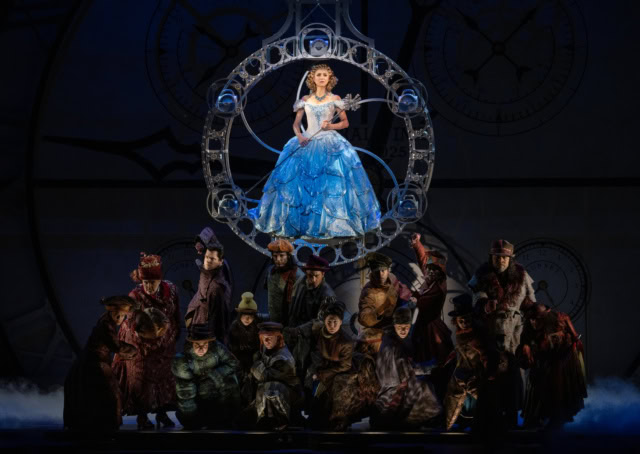
The sets are just as impressive as the Broadway version, with this take on the land of Oz featuring a mixture of classic design with a steampunk feel. Things, such as Glinda’s bubble, appear mechanic in style, with many of the costumes featured complimenting that as well. Especially when you get into the city of Oz properly. It’s an interesting feel that sets aside Wicked from that of The Wizard of Oz, which is a traditional musical in nearly every way.
While I have been a fan of Wicked for a long time, some aspects of this North American tour set it apart from other iterations. Olivia Valli is fantastically wicked as Elphaba, who adds a softer side to the rough edges of the character. Valli is a powerful house that is on par with the likes of Idina Menzel, who originated the role. She gave me chills with her last note in “Defying Gravity”, the empowering number that closes out the first act. She has to be one of my favorite Elphabas that I’ve seen on stage, and I cannot wait to see her again in just a few weeks.
Kathy Fitzgerald was also sublime as the evil Madame Morrible. Madame Morrible is one of those characters that you just love to hate, who makes you laugh and also sends chills down your spine. Fitzgerald captures that energy perfectly, putting her spin on Madame Morrible, who is truly the villain of the show.
Many of the actors put their spin on the characters, with some paying off more than others. Celia Hottenstein was a perfect replica of Kristin Chenoweth, but that is all she came off to be. Glinda felt like a one-for-one copy of the original, which is perhaps what some in the audience would want. However, as a result, Glinda felt a little stiff, as it didn’t feel like Hottenstein was able to make the role truly hers. I will be interested to see if this changes at all when I see it again.
There also felt something off between the chemistry of our two leads. They were both good in their respective roles, with Valli outshining nearly everyone on stage. But when Glinda and Elphaba were on stage together, it didn’t feel quite right. Like it was almost there, the pieces of the puzzle almost slid into place. However, when hearing “For Good”, which usually makes me sob, I didn’t feel the emotional connection between these two.
Final thoughts on the Wicked musical North Amercian Tour
Overall, Wicked is always a fun time and a worthwhile night out to the theater, especially if you recognize the story. Our lead is worth every moment of the show, with Valli stealing every scene she’s in. Wicked also has many practical effects, which it has mastered throughout its 20 years.
Children and adults alike will be stunned by the wonderful show that plays out on stage, which provides plenty of laughs, some impressive vocals, and a story that is brimming with heart and soul. So Wicked should definitely be on your list, as this adaptation of Gregory Maguire’s novel is not one to miss.
Wicked is in Detroit for a few more weeks, and is touring around North America to other cities!

